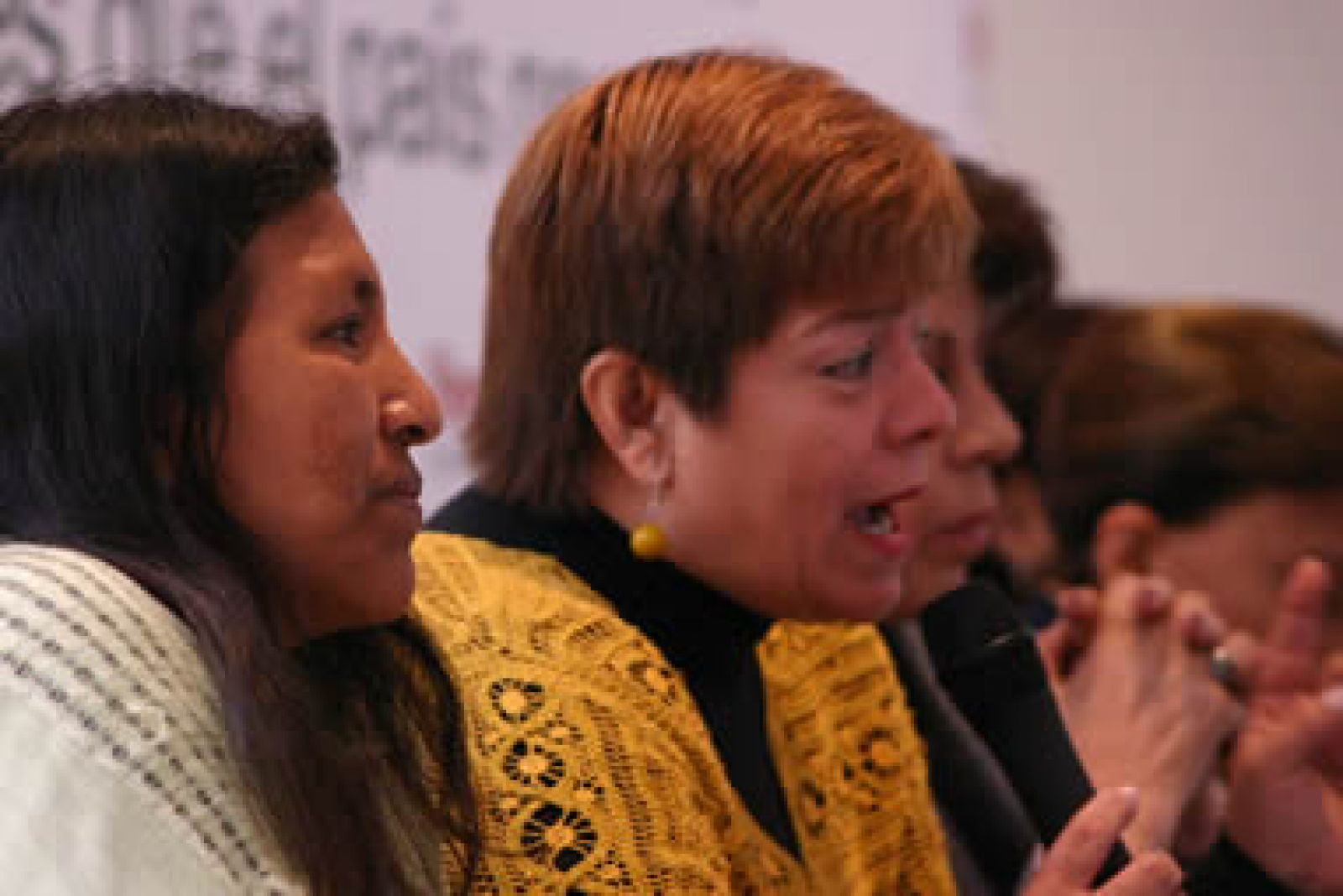
SHARE
It’s election season in Colombia, where historically polls have been marred by violence, allegations of fraud and intimidation by armed groups allied with candidates. Legislative elections took place on March 14 and the first round presidential poll is set for May 30.
NDI and several local partners are working to increase transparency around the elections to help Colombia continue its democratic progress. In the lead up to the legislative balloting, in which 2,500 candidates vied for four-year terms as senators and representatives, NDI collaborated with national and local media and political advocacy groups to organize candidate debates.
Working with Vote Well (Votebien, www.votebien.com), an initiative of Colombian nongovernmental organizations that provides nonpartisan information on the electoral process, and other local partners, NDI organized six candidate debates. Four were with candidates for the Chamber of Representatives, one with women Senate candidates and one with candidates competing in Colombia’s first election for members to the Andean Parliament, a regional cooperation organization including Colombia, Bolivia, Ecuador and Peru.
NDI worked with civic groups and political parties in the capital city of Bogotá as well as in two regions in which the Institute has focused on bringing underrepresented groups into the process: the poverty-stricken, predominantly Afro-Colombian department of Chocó and the post-conflict Montes de María region. NDI organized the debates, assisting parties and civic groups to identify issues of local concern. Over 500 Colombians attended, and the debates were mentioned in local newspapers and could be seen through streaming video. Vote Well’s journalists wrote 30 articles that were posted on its website, with an emphasis on priority issues for Chocó and the Montes de María region as well as women and Afro-Colombian candidates, who have historically been underrepresented in the Colombian legislature.
Transparency for Colombia (Transparencia por Colombia, TPC) has worked since 1998 to lead civil society initiatives to fight corruption and encourage transparency in the public and private sector. NDI first partnered with TPC to develop a Microsoft Excel-based version of the Clear Accounts campaign finance reporting software for the October 2007 regional and local elections. Colombia’s electoral authorities then adopted the tool as their suggested mechanism for preparing reports. After receiving TPC’s upgraded, Web-based software in February 2010, the National Electoral Council (Consejo Nacional Electoral) made the use of Clear Accounts mandatory for the congressional election and, later, for the presidential election. TPC conducted trainings to receive feedback on the software and provide support to political parties and candidates. Through April 14, almost 80 percent of the 2,500 legislative candidates had submitted the required reports.
NDI also partnered with TPC in 2009 to develop a 28-page booklet to raise awareness among Colombian political parties about the importance of disclosing information and provide practical steps that parties can follow. The booklet is available in Spanish on NDI’s website.
Another local NDI partner, Transparency for Colombia (Transparencia por Colombia, TPC), the Colombian affiliate of Transparency International, played a major role in bringing financial transparency to the elections. Using a grant from NDI, TPC developed a web-based system that allowed all parties and candidates to submit required financial information online and generated automatic reports on candidate and party income and expenses for the National Electoral Council. In response, the authorities adopted TPC’s software as the official and required tool for candidates to use to file their reports through the website, www.cnecuentasclaras.com.
NDI also supported a domestic election monitoring group, the Election Observation Mission (Misión de Observación Electoral, MOE), in its effort to extend its reach in the Caribbean and Pacific coasts of Colombia for the legislative and presidential elections. The Institute helped MOE design observation materials and adopt technology, communications and data analysis strategies to aid their observation. For the legislative elections, MOE fielded over 1,700 observers in coastal regions, historically more vulnerable to concerns of voter fraud, as part of its nationwide observation.
In the six weeks leading up to the elections, NDI conducted party pollwatching workshops in 15 cities across Colombia, preparing more than 1,400 party representatives to safeguard the process. The Institute distributed 7,000 educational CDs with information on party pollwatching procedures. Additionally, NDI met with candidates and their campaign staffs from seven political parties in six cities to discuss campaign strategies, including techniques for increasing direct voter contact and conducting issue-driven campaigns.
As the May 30 presidential election approaches, NDI has continued to work with Colombian civic groups, political parties and electoral authorities to promote a more transparent electoral process through domestic observation, party pollwatchers and financial accountability tools. NDI is supporting a campaign to increase citizens’ access to information as well as awareness of candidate proposals, working with local organizations to identify their priorities and facilitate the dissemination of candidate responses. NDI is also producing print and electronic civic education materials on procedural voting details, ways to cast an informed and reasoned vote, and holding winners accountable. As part of this process, NDI co-organized a May 4 debate between five vice-presidential candidates (see photo slideshow below), centered on social issues such as political inclusion, education, health, public security and transportation and mobility.
Pictured above: Women candidates for the Senate participate in one of six debates NDI helped to organize before legislative elections.
Published May 20, 2010




